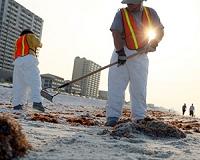| . |  |
. |
New Delhi (AFP) June 8, 2010 Indian politicians, campaigners and newspapers vented outrage Tuesday at two-year prison terms handed to those found guilty over the 1984 Bhopal gas leak disaster that left thousands dead. Anger focused on the 25-year delay in the convictions, the perceived leniency of the sentences and the feeling that the "big fish" -- the chief executive of the US parent group Union Carbide -- had got away. Seven Indian managers from the pesticide factory that caused the world's worst industrial accident were found guilty in a court in Bhopal on Monday and each sentenced to two years in jail. They were all granted bail and will now begin what promises to be a lengthy appeal process. The two-year sentences were the maximum that could be imposed after the Supreme Court in 1996 reduced the charges from culpable homicide to negligence, but many survivors said the guilty should be hanged. "It is sad but true that we live in a country that does not understand the value of life," Bhopal activist Hemlata Sahay told AFP. "The guilty can easily get away and the victims are destined to suffer." One survivor, Champa Devi Shukla, said she "felt like an idiot holding a placard outside the court while the accused left in big cars". "Shame On India" headlined the Mail Today, while the front page of The Times of India read: "Justice Delayed, Denied." The Express, The Times and NDTV news channel focused on the "man who got away" -- Union Carbide's then-chief executive Warren Anderson, who fled India after the disaster and was named as an absconder by the court. The ageing former executive lives in suburban New York, and the Hindustan Times blamed the Indian government for allowing him "to live a life of ease far away in the US while the victims struggle from day to day". Anderson is unlikely to ever return to India, but Law Minister M. Veerappa Moily told NDTV that the case against him was still open and that he "can be still be tried". Shivraj Singh Chouhan, the chief minister of Madhya Pradesh state, of which Bhopal is the capital, demanded radical legal reform and more help for survivors. "The present laws are inadequate in dealing with the tragedy," he said. "The punishment in this case is too little and laws should be amended to ensure maximum punishment." The prosecution argued in the Bhopal court that there were design defects in the factory as well as other criminally negligent operational practices that were known to management but ignored for commercial reasons. Dow Chemical bought Union Carbide in 1999 and says all liabilities related to the accident were cleared in a 470-million-dollar settlement reached out of court with India's government in 1989. In a statement Monday, the company said the appropriate people had faced trial, arguing that US executives were not involved in the day-to-day running of the majority-owned Union Carbide India Ltd. Robert Blake, the US assistant secretary of state for South Asia, told reporters in Washington that he hoped the guilty verdicts would "bring some closure to the victims and their families". The disaster was unleashed on December 3, 1984 when a lethal plume of gas escaped from a storage tank at the Union Carbide pesticide factory, killing thousands in the surrounding slums and residential area. Government figures put the death tollat 3,500 within three days of the leak, but the state-run Indian Council of Medical Research puts the figure at between 8,000 and 10,000 in the same period. The ICMR has said that up to 1994, 25,000 people also died from the consequences of gas exposure, and victims groups say many are still suffering the effects today. After the verdicts, other commentators saw repercussions for controversial legislation that the ruling Congress-led government is trying to pass to cap the legal liabilities of US nuclear firms operating in India. The measure is key to putting into operation a 2008 civilian nuclear agreement with the United States that will give India access to US nuclear technology.
Share This Article With Planet Earth
Related Links Our Polluted World and Cleaning It Up
 Oil will damage southern US coast for years
Oil will damage southern US coast for yearsWashington (AFP) June 7, 2010 The long-term effects of the Gulf of Mexico oil spill will damage fragile ecosystems for years to come, US officials said Monday, as engineers successfully captured more crude from a broken wellhead. "Dealing with the oil spill on the surface will go on for a couple of months," said Admiral Thad Allen, who is coordinating the government's response to what has been called the worst environmen ... read more |
|
| The content herein, unless otherwise known to be public domain, are Copyright 1995-2010 - SpaceDaily. AFP and UPI Wire Stories are copyright Agence France-Presse and United Press International. ESA Portal Reports are copyright European Space Agency. All NASA sourced material is public domain. Additional copyrights may apply in whole or part to other bona fide parties. Advertising does not imply endorsement,agreement or approval of any opinions, statements or information provided by SpaceDaily on any Web page published or hosted by SpaceDaily. Privacy Statement |